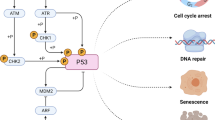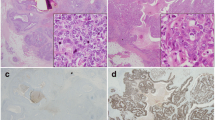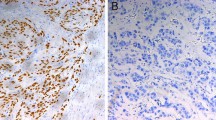Abstract
We previously reported that introduction of the wild-typep53 gene into human cancer cells with deletedp53 enhanced apoptosis induced by chemotherapy [Fujiwara et al. (1994) Cancer Res 54∶2287]. This suggests thatp53 status could be a potent determinant of the therapeutic efficacy of DNA-damaging cancer therapy. We analyzed 24 patients with gastric or colorectal cancer forp53 mutations and apoptotic changes in surgical specimens. Out of 11 patients with gastric cancer, 3 were treated with chemotherapeutic drugs before resection; 5 of 13 patients with colorectal cancer had 30 Gy radiation prior to surgery.p53 mutations were detected in 4 cases of gastric cancer (36.4%) and in 6 cases of colorectal cancer (46.2%) by immunohistochemical staining. The preoperative DNA-damaging therapies increased the number of apoptotic cells in wild-type-p53-expressing tumors; tumors with mutantp53, however, significantly showed fewer apoptotic cells compared with those expressing wild-typep53. Thep53-inducible WAF1/CIP1 protein was immunohistochemically observed in wild-type-p53-containing tumors, where-as mutant-p53-expressing tumors expressed no detectable WAF1/CIP1. Taken together, we conclude thatp53 mutations are associated with the poor response of chemotherapy and radiotherapy.
Similar content being viewed by others
Abbreviations
- TUNEL :
-
terminal deoxynucleotidyltransferase-mediated biotin-dUTP nick-end labeling
References
Clarke AR, Purdie CA, Harrison DJ, Morris RG, Bird CC, Hooper ML, Wyllie AH (1993) Thymocyte apoptosis induced byp53-dependent and independent pathways. Nature 362:849–852
El-Deiry WS, Tokino T, Velculescu VE, Levy DB, Paesons R, Trent JM, Lin D, Mercer E, Kinzler KW, Vogelstein B (1993) WAF1, a potent mediator of p53 tumor suppression. Cell 75:817–825
El-Diery WS, Harper JW, O'Connor PM, Velculescu VE, Canman CE, Jackman J, Pietenpol JA, Burrell M, Hill DE, Wang Y, Wiman KG, Mercer WE, Kastan MB, Kohn KW, Elledge SJ, Kinzler KW, Vogelstein B (1994)WAF1/CIP1 is induced in p53-mediated G1 arrest and apoptosis. Cancer Res 54:1169–1174
Fan S, El-Deiry WS, Bae I, Freeman J, Jondle D, Bhatia K, Fornace AJ, Magrath I, Kohn KW, O'Connor PM (1994) p53 gene mutations are associated with decreased sensitivity of human lymphoma cells to DNA damaging agents. Cancer Res 54:5824–5830
Fujiwara T, Grimm EA, Mukhopadhyay T, Zhang W-W, Owen-Schaub LB, Roth JA (1994) Induction of chemosensitivity in human lung cancer cells in vivo by adenovirus-mediated transfer of the wild-type p53 gene. Cancer Res 54:2287–2291
Gavrieli Y, Sherman Y, Ben-Sasson SA (1992) Identification of programmed cell death in situ via specific labeling of nuclear DNA fragmentation. J Cell Biol 119:493–501
Harper JE, Adami GR, Wei N, Keyomarsi K, Elledge SJ (1993) The p21 Cdk-interacting protein Cip1 is a potent inhibitor of G1 cyclin-dependent kinases. Cell 75:805–81
Harris CC, Hollstein M (1993) Clinical implications of the p53 tumor suppressor gene. N Engl J Med 329:1318–1327
Hollstein M, Sidransky D, Vogelstein B, Harris CC (1991)p53 mutations in human cancers. Science 253:49–53
Horio Y, Takahashi T, Kuroishi T, Hibi K, Suyama M, Niimi T, Shimokata K, Yamakawa K, Nakamura Y, Ueda R, Takahashi T (1993) Prognostic significance ofp53 mutations and 3p deletions in primary resected non-small cell lung cancer. Cancer Res 53:1–4
Kaufmann SH (1989) Induction of endonucleolytic DNA cleavage in human acute myelogenous leukemia cells by etoposide, camptothecin, and other cytotoxic anticancer drugs: a cautionary note. Cancer Res 49:5870–5878
Kinzler KW, Vogelstein B (1994) Cancer therapy meets p53. N Engl J Med 331:49–50
Lowe SW, Schmitt EM, Smith SW, Osborne BA, Jacks T (1993)p53 is required for radiation-induced apoptosis in mouse thymocytes. Nature 362:847–849
Lowe SW, Ruley HE, Jacks T, Housman DE (1993)p53-dependent apoptosis modulates the cytotoxicity of anticancer agents. Cell 74:957–967
Lowe SW, Bodis S, McClatchey A, Remington L, Ruley HE, Fisher DE, Housman DE, Jacks T (1994) p53 status and the efficacy of cancer therapy in vivo. Science 266:807–810
Martin HM, Filiple MI, Morris RW, Lane DP, Silvestre F (1992)p53 expression and prognosis in gastric carcinoma. Int J Cancer 50:859–862
Shin DM, Kim J, Ro JY, Hittelman J, Roth JA, Hong WK, Hittelman WN (1994) Activation of p53 gene expression in premalignant lesions during head and neck tumorigenesis. Cancer Res 54:321–326
Sinicrope FA, Ruan SB, Cleary KR, Stephens LC, Lee JJ, Levin B (1995) bcl-2 and p53 oncoprotein expression during colorectal tumorigenesis. Cancer Res 55:237–241
Thompson AM, Anderson TJ, Condie A, Prosser J, Chetty U, Carter DC, Evans HJ, Steel CM (1992) p53 allele losses, mutations and expression in breast cancer and their relationship to clinicopathological parameters. Int J Cancer 50:528–532
Williams GT, Smith CA (1993) Molecular regulation of apoptosis: genetic controls on cell death. Cell 74:777–779
Yokozaki H, Kuniyasu K, Kitadai Y, Nishimura K, Todo H, Ayhan A, Yasui W, Ito H, Tahara E (1992) p53 point mutations in primary gastric carcinomas. J Cancer Res Clin Oncol 119:67–70
Author information
Authors and Affiliations
Rights and permissions
About this article
Cite this article
Hamada, M., Fujiwara, T., Hizuta, A. et al. Thep53 gene is a potent determinant of chemosensitivity and radiosensitivity in gastric and colorectal cancers. J Cancer Res Clin Oncol 122, 360–365 (1996). https://doi.org/10.1007/BF01220804
Received:
Accepted:
Issue Date:
DOI: https://doi.org/10.1007/BF01220804




